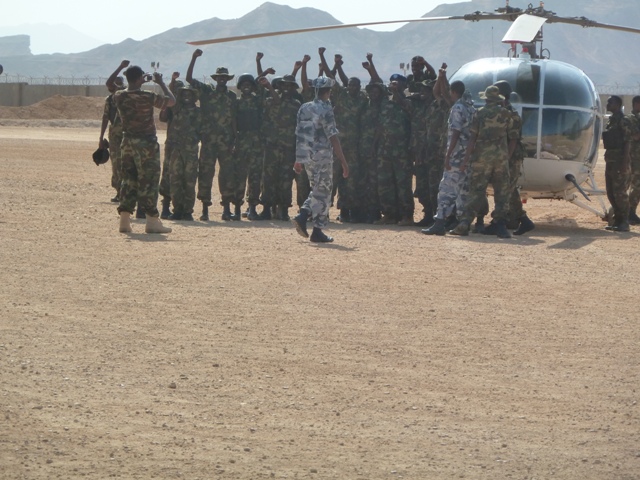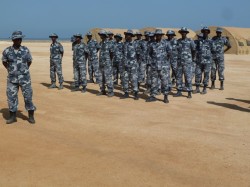The rise, fall, and rebirth of the Puntland Maritime Police Force (PMPF) is a bizarre and thrilling story that I have been following, to the point of obsession, for the last two years. As CIMSEC readers are surely aware, one is hard pressed to find a report on Somali piracy that does not advocate an onshore solution for this maritime crime.

When it came to actually establishing security and rooting out pirate bases in the autonomous region of Puntland however, it was not NATO, the EU, the U.S, or U.K. that took the lead, but a South African private military company financed by the United Arab Emirates.
The PMPF has earned international praise for denying pirate gangs an onshore sanctuary and for rescuing hostage mariners, but has also been labeled an unaccountable private army by UN monitors. Despite international pressure, financial arrears, and pirate infiltration the PMPF and its South African mentors continue to march on. With piracy now largely eliminated, the marines appear to have engaged a new foe—the Islamist insurgents of al-Shabaab.
This, courtesy of Foreign Policy, is their story:
“The Wild West in East Africa” by James Bridger and Jay Bahadur.
Note: The views expressed are solely those of the authors and do not necessarily represent those of their governments, militaries, employers or the Center for International Maritime Security.


The accompanying FP piece is great, particularly as its the first reporting I’ve ever seen offering specifics on PMPF operations and the various private security firms associated with that effort (most stuff I’ve seen generically names Saracen and various other “unknown” states and entities).
Having said that, I’m as reluctant to give the PMPF and their mercenary trainers credit for beating Somali pirates as any of the other usual suspects that have been patting themselves on the back. First, what impact can the PMPF have on the Hardhere-based gangs? Second, the the timing is suspicious. Press reporting on what ultimately became the PMPF started in late 2010…but they didn’t start operating until May-June 2012. Most of the operations described in the FP piece didn’t start until after last June…Somalia Report (somehow giving the credit to PMPF) was already calling piracy over by last June. The operations described here targeted specific gang leaders…the operation that involved US law enforcement/military and Puntland authorities to get the “mastermind” of the QUEST hijacking happened in April 2011…maybe that was just as important as a signal from the Puntland government that involvement in piracy would no longer be tolerated.
If you subscribe to the Stig Hansen theory that piracy exploded in 2008 because the Puntland government laid off police and militias, then it makes sense that the PMPF will help keep piracy down just through paying potential pirates to do other things (fight Al Shabab on behalf of the Puntland state?). It’s a little to much of a leap to give this effort the lion’s share of credit for beating piracy, however…as it seems to already have been in the decline before the PMPF really got going.
Hi Mark, thanks for your comments on the article. The steep decline in piracy is due to a number of factors–better coordinated naval patrols, BMPS, armed guards, and political/security developments on land. Each of these has played their part, but the PMPF is only Somali security force that has conducted any counter-piracy operations on land. You’re right that they have little impact on the Haradhere gangs and that Puntland based piracy was already on the decline before they became operational. However, the PMPF have prevented the Puntland gangs from returning to any of their previous anchorages and have opened up political space for the Puntland government to negotiate with local leaders that had previously tolerated/supported piracy.
I am born and raised in the West and my family are from Puntland and I can reassure you that Puntland President is doing his best to keep the state pirate free. The number of piracy attacks from Puntland’s shores have been reduced significantly you can count the number of attacks by hand. Bases in EYL, Gara’ad, Hafun are not there anymore. If the pirates can’t operate on-land then they have nowhere to take the captured ships and this is what truly brought down piracy attacks in my opinion.
As far as NATO is concerned it helped reduced the piracy attacks from the highs it usd to be however it didn’t bring it down to this level when the PMPF started operation., NATO was there for years and pirate attacks were still occuring daily. I believe the reason for this is maritime traffic technology available which can tell you where ships are.
Finally the harar-dhere pirates are outside Puntland’s Jurisdiction and controlled by another state government called Galmudug. The PMPF cannot go there because this can lead to a confrontation for invading a territory in the hands of another government. I think the harar-dhere piracy is another nail in the coffin about NATO stopping piracy because if that was the case then harar dhere pirates wouldn’t be operating.
The best way to fight piracy is to fund and keep the PMPF in place. Because Puntland has the largest coast-line in Somalia and happens to be located at the busiest shipping lane in the world. It is prime real-estate for piracy. A strong PMPF on-land means no-one brings hijacked vessels on Puntland’s shores, this is what we see occuring now.
However To completely eradicate piracy the PMPF will need a-lot more funding to control it’s coastline so they can stop other pirates from surrounding regions like harardhere hijacking ships and then taking it to they’re own areas. This is exactly what is occuring now. The game-plan for the pirates now is to hunt in Puntland waters because of its prime location being the busiest shipping lane in the world and then take the ships back to zones outside of PMPF control.
The only way to eliminate this new game-plan by the pirates is in my opinion to fund the PMPF a-lot more then they are now and train them to patrol the coast-line and prime piracy locations. This would require bigger funding to equip and train more PMPF and provide them with state of the art naval vessels and equipments with more air logistics such as helicopters to monitor from the air. The two areas of focus would need to be 1. The Gulf aden and indian ocean junction point because it is the world’s busiest shipping lane. 2. The southern borders of Puntland beyond gara’ad which is close to harar-dhere and stop the pirates from other jurisdictions entering Puntland waters. I can guarantee you that will eliminate piracy.
I am fairly certain the world knows how to eliminate piracy but I have a feeling they really don’t want to. Because this a big money earner not just for pirates but heaps of different sectors that profit from insecurity like insurance companies selling higher premiums to ships going past this area, security companies providing more armed guards for ships, etc.
As a note to your last point… for the longest time, private security has been roughly illegal on commercial vessels. As that NATO has failed to counter piracy effectively for over a decade, it couldn’t be the influence. As for insurance companies, I’m sure the multi-billion dollar corporations that are paying this extra insurance have more political heft than Lloyds of London. The failure to fight piracy effectively came from a lack of political will and nothing more.
Ahmed,
I agree with many of your comments and have a more in-depth article I wrote on the PMPF that I would like to send you. Please drop me an email at jbridger@delex.com.
Cheers,
James
Matt, Whatever the reason is. The fact boil down to supporting Puntland Maritime Forces. This is a busy shipping lane, if this isn’t solved now it can have a spill over effect where western interests can be jepordized. For example thankfully the pirates are only using the ships for ransoms now but what about if they do indeed become political and are influenced by al-shabab and al-qaeda who take them under they’re wing and tell them to go hunt every oil container out in sea and don’t let it go. Obviously if this done day in and day out over time this can lead to an oil shortage for the western world. There are even other interests that can be jepordized.
James, I would like to see your articles. In all honesty I might’ve overlooked an issue which kind of relates to what Matt was saying about the lack of political will. Somalia is still really a recovering war-zone it can still easily slip back into civil war especially if America or the West are seen arming one stakeholder over another not to mention the u.n arms embargo still in place for Somalia it can lead to legality issues. I guess this might explain the lack of political will. It’s just too messy.
But I think there are ways around this especially if the president of Somalia and puntland are both informed that funding will be provided to PMPF as long as certain objectives are being met and that it is not allowed to be used for politcal or militant purposes against civilians in Somalia minus al-shabab and al-qaeda elements. There can even be a stipulation If it has been found that the arms have been t used for war-mongering or political gains within Somalia funding will be immediately ceased.
Trust me Puntland nor Somalia have the capacity to be servicing and maintaining any sophisticated tools on its own without external support and it will just end up rotting away and they know this.